Are you here alone? A question I’m asked often on this trip. I take it as well-meaning, borne of curiosity more than accusation. What gets tiring are the follow-up questions of, Why did you not bring your boyfriend? Next time, it would be better to bring a boyfriend here? At that point, it can start to feel like flirtation, or at least fetishizing. The Liberated Western Woman at large.
I am here alone, in a technical sense. I’m not traveling with other humans. But when I think about the past week spent in the Gili Islands, it doesn’t feel like I’ve been alone much at all.
Perhaps what I mean is, I haven’t been lonely. Not since leaving Bali, a place I did not always like. There were a few days in Ubud when I indeed felt lonely, adrift in a sea of tourists being peddled spiritual enlightenment in an overcrowded mountain town. It… wasn’t for me. So I switched plans and took a ferry to a collection of islands off the coast of Lombok.
These islands have no cars or scooters, only bicycles and horse carts to get around. Days are spent wandering the beach and snorkeling to see coral reefs and the fish and turtles that call them home. I can breathe here, and rest.
After spending four nights on Gili Meno, I switched to the busier Gili Air. I was a bit frazzled while packing and realized, after running down the dock to catch a ferry, I left my book. An inconsequential mishap, you’d think. But after browsing the two trade-only bookshops on this new island, I learned it would not be easily replaced.
My accommodations on the last island were rustic and priced appropriately. I had a one-room bungalow, and everything I needed. But the tap water came from a well whose supply was partly salinated. It was odd to brush my teeth with a hint of salt, though showering did wonders for that beachy hair texture. The bathroom was open, as is the case with most places here, and reliably each night, a gecko would poop on the floor. Been eating a lot of flies, I would say to it as I wiped up the mess. Good boy.
The second morning there, I made a friend. She approached with confidence and heart-melting mews. Soon she was sitting on my lap and purring, and our friendship blossomed.
The Gili Islands are overrun with cats, and I’d been told not to let the ones that live near my bungalow inside. It wasn’t because of disease—there’s a robust care program on island—but instead, not to train them to expect that in case future guests aren’t so cat-friendly. So me and this little lady spent our time together on the deck.
It’s rainy season and the next afternoon, a storm moved in. Within minutes it was a downpour. I was cozy inside my bungalow when there she was, meowing at the door as wind bent the trees out front. Of course I let her in. We spent the next hour napping and watching Youtube (she seemed to like the sailing videos). A perfect way to weather out the storm.
As I prepared to head to Gili Air, the idea of leaving this cat hit hard. In my few days on Meno, she’d become a reliable companion. We’d sit together on the deck, or go for walks to and from the main house area. She welcomed me when I came back from my snorkeling adventures.
I heard she belonged to the accommodation’s owner, but they were nowhere to be seen. The local men working at the place fed her and the other cats that lived there but didn’t show them affection. My attachment and a dash of white savior complex set in, not to mention the internet’s cat distribution system brain worm. Had she chosen me? Was this cat now… mine?
With the help of a few days’ perspective, I can see my thought process more clearly. Meno is remote, and my interactions with humans were minimal. The men working where I stayed were kind, and we spoke in limited English and head nods. But our gender and cultural divides were strong. That cat, with whom I genuinely bonded, had become my best friend.
I was scattered while packing in part due to fears I was somehow abandoning her. The men were also sad I was leaving, so I felt guilty all around. In a haze of anxiety, I left my other best friend, the book, next to the bed.
I could tell this other island, Gili Air, suited me from the start. More people, including more foreigners, meant I didn’t feel so observed. But as I settled into the new place without a feline greeting or a book to read, the sadness hit. I missed my friends.
Happiness [is] only real when shared, or so Christopher McCandless scrawled while dying alone in Alaska. Two weeks into this solo journey, I wonder how to respond.
Do you think McCandless was thinking only of humans when he wrote that? It was apparently a response to a passage in Dr. Zhivago: “And so it turned out that only a life similar to the life of those around us, merging with it without a ripple, is genuine life, and that an unshared happiness is not happiness…”
There’s nothing like spending time with another person in mutual understanding. Being part of a team that fits together. On the flip side, sometimes the fiercest loneliness is felt in companionship that does not meet our needs.
I assume McCandless was thinking only of humans. But the Zhivago quote leaves room for a broader vision too. A life in concert with the world around us, moving in its rhythms, is the most genuine life I can picture.
Perhaps this is preaching to the choir. I sense many of you are sensitive and consider how our treatment of the land, animals, and even our built environments reflects our values and desires for a better life. This includes undomesticated animals—dogs may be man’s best friend and all but, what about the animals who live freely in our midst? As much as the jungle scares me, with all its creepy crawlers I’m happy not to have up north, there’s something lovely about sharing my bathroom with a gecko. Recognizing that, like all borders, walls are a temporary farce.
Non-humans have been our companions for, well, ever. But perhaps what gets lost in the societies I frequent is a question about which companions count. We assume human primacy, and certain humans above others at that.
writes: “Similarly, I do not privilege humans in my accounting of relations or relatives. I lodge without other humans most of the time. But my treasured companion most days is the North Saskatchewan River that flows just outside my south-facing windows, large as life.”Why does that statement feel at once mundane and revolutionary? It goes without saying that our physical environments shape us as we shape them. Perhaps what’s revolutionary is calling this a relationship. Using words to acknowledge the pleasure of sharing our lives with, and taking time to observe, the nonhumans around us.
Since arriving on these islands, I haven’t felt alone. Because, well, I’m not. Even with limited socializing, I’ve been getting to know the land. Sitting, walking, biking, swimming, all while observing what I can.
I’m at peace now about leaving the book and the cat behind. Over the past few days, I exchanged messages with the cat’s owner and have no doubt she is loved. She was never mine to “have” but instead, to enjoy for a while.
And the book? Well, I definitely want to finish it. I’d been reading Barbarian Days by William Finnegan and was at the point where he traipses through the South Pacific in search of perfect surf. Even without much interest in surfing, I thought about his obsession with waves while floating in my snorkel mask and admiring the world of a reef hidden just below the break.
It’s possible I can retrieve the book from Meno. But otherwise, I’ll buy another copy when I’m back in the land of commerce. It’s okay to be without immediate comfort for a few days.
𓆉 ⋆。˚𓇼 ⋆。˚𓆟
Well well well, what do you know. I’m writing at the table in my new place when two greenish eyes and ears pop up from under the deck. I smile and she meows. A tiny thing, speckled white and black like a cow. She’s skittish and seems to be practicing her hiss. I don’t get up and instead pour a little milk in the saucer of my coffee cup and place it on the ground. (First time I’ve left a saucer of milk for a cat! What a classic move and yes, it works.) Now she’s here, at my feet.
There are cats everywhere on Gili, and most are well-cared for. Perhaps my connections with them feel more pronounced because I’m without another human? Or perhaps they’d be the same even so. The purity of getting to know an animal is unmatched. No social dynamics to navigate, just body language and vibrations.
Are you here alone? Honestly, I don’t think so. At any rate, I’d say the happiness I’ve felt this last week, in glimmers and in spurts, is real.
Thanks for reading an attempt to share it.

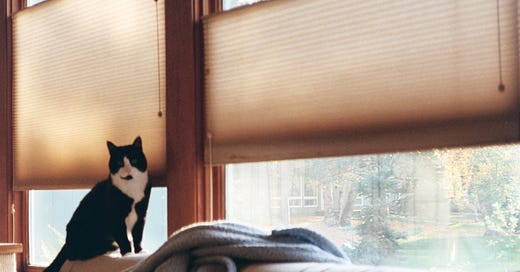


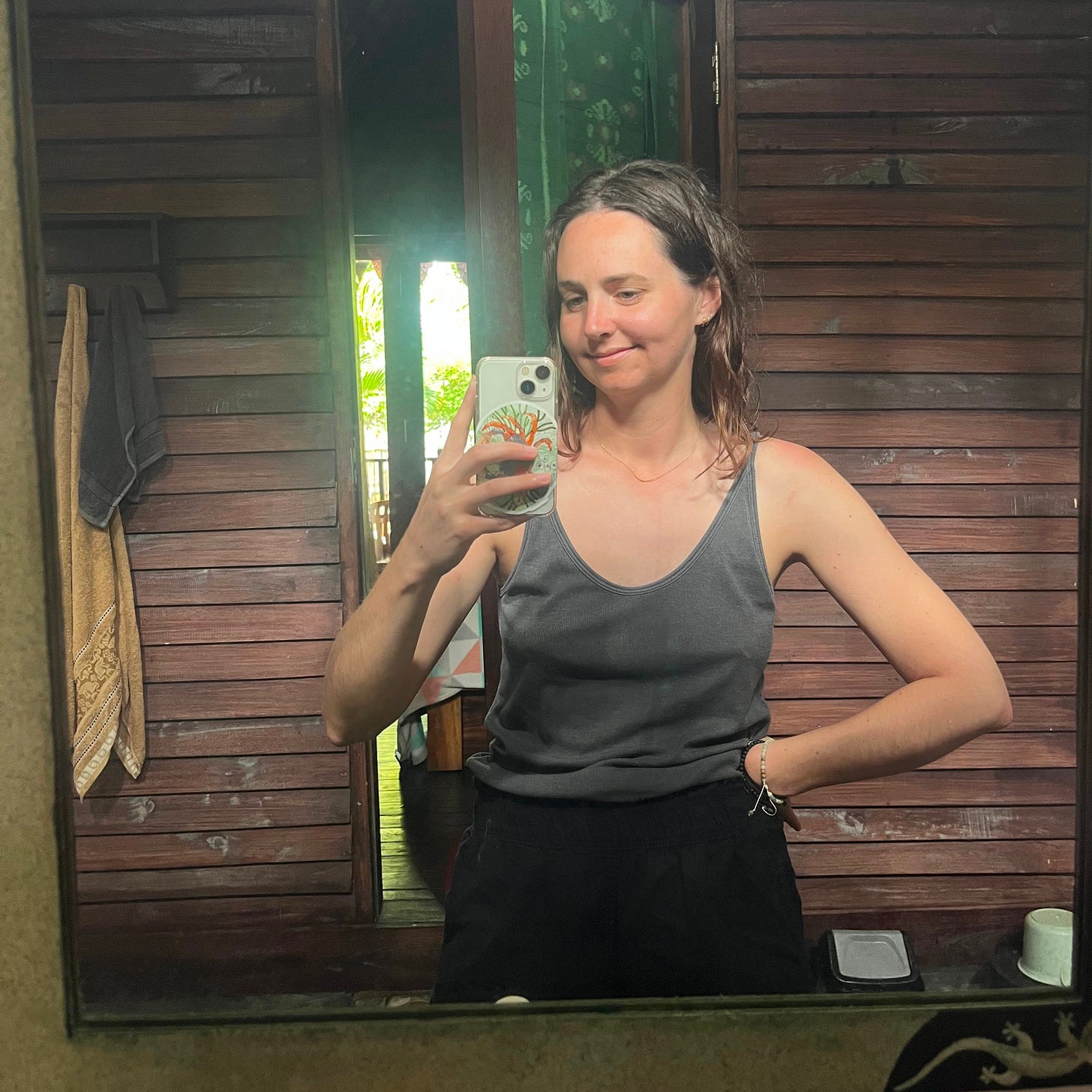
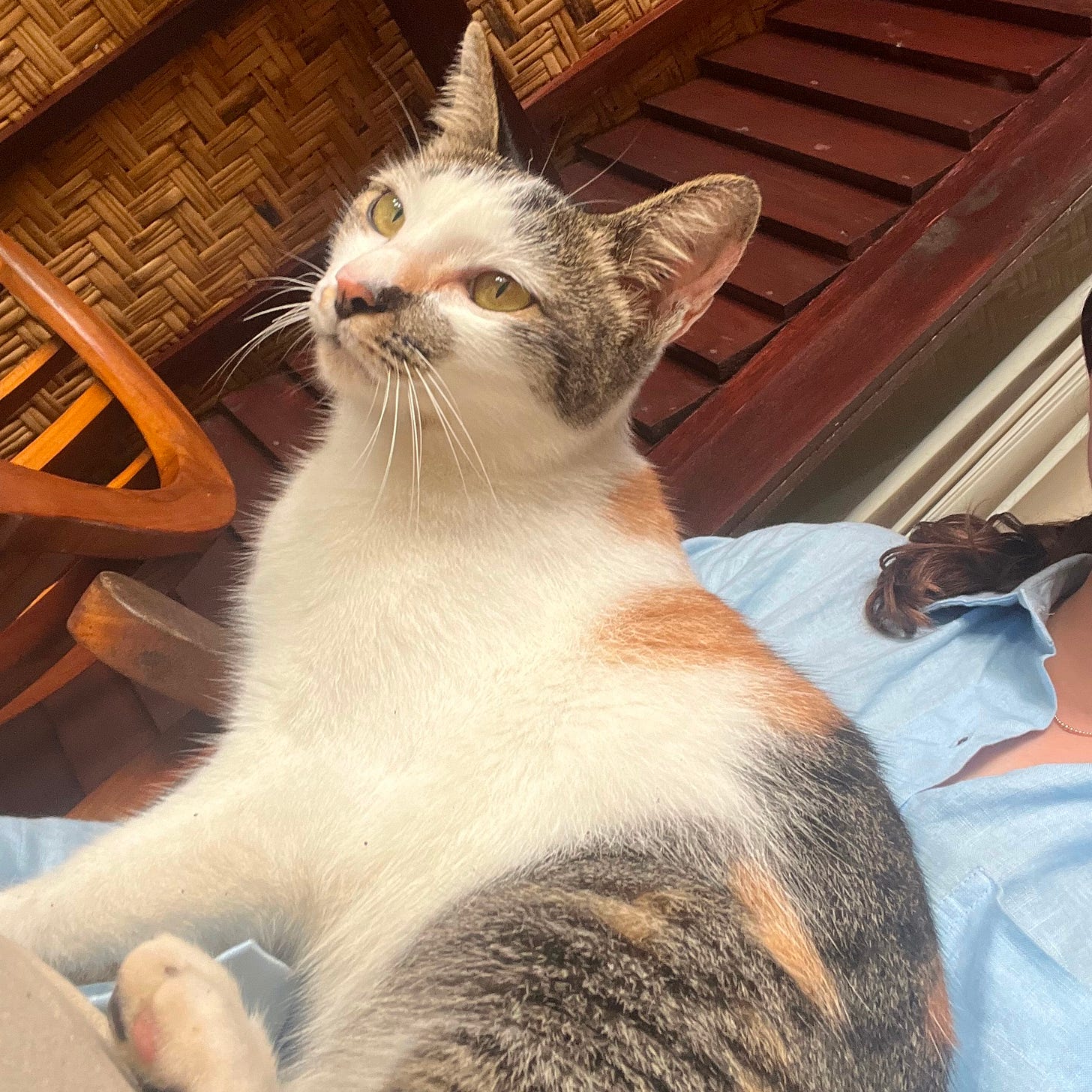
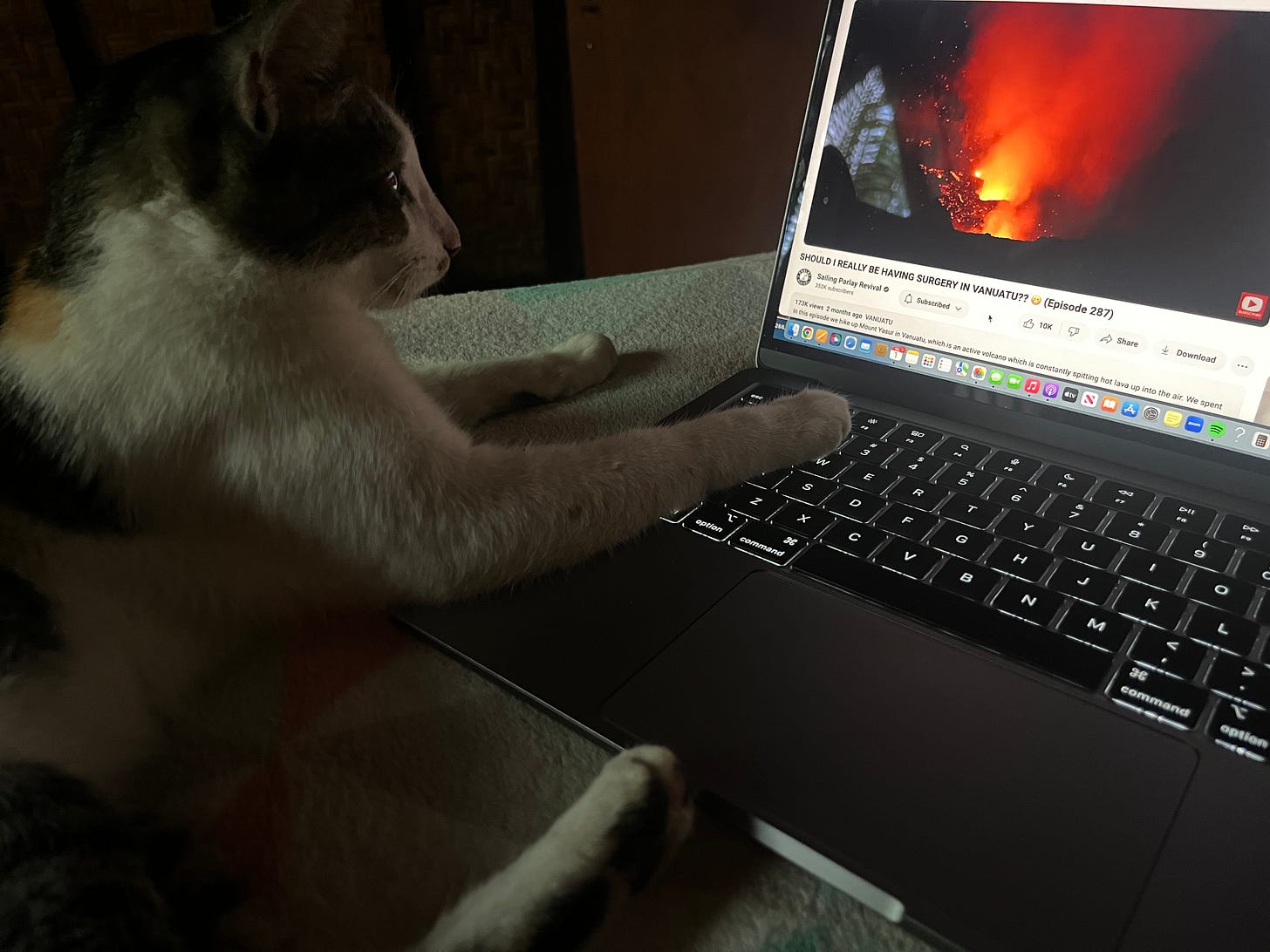
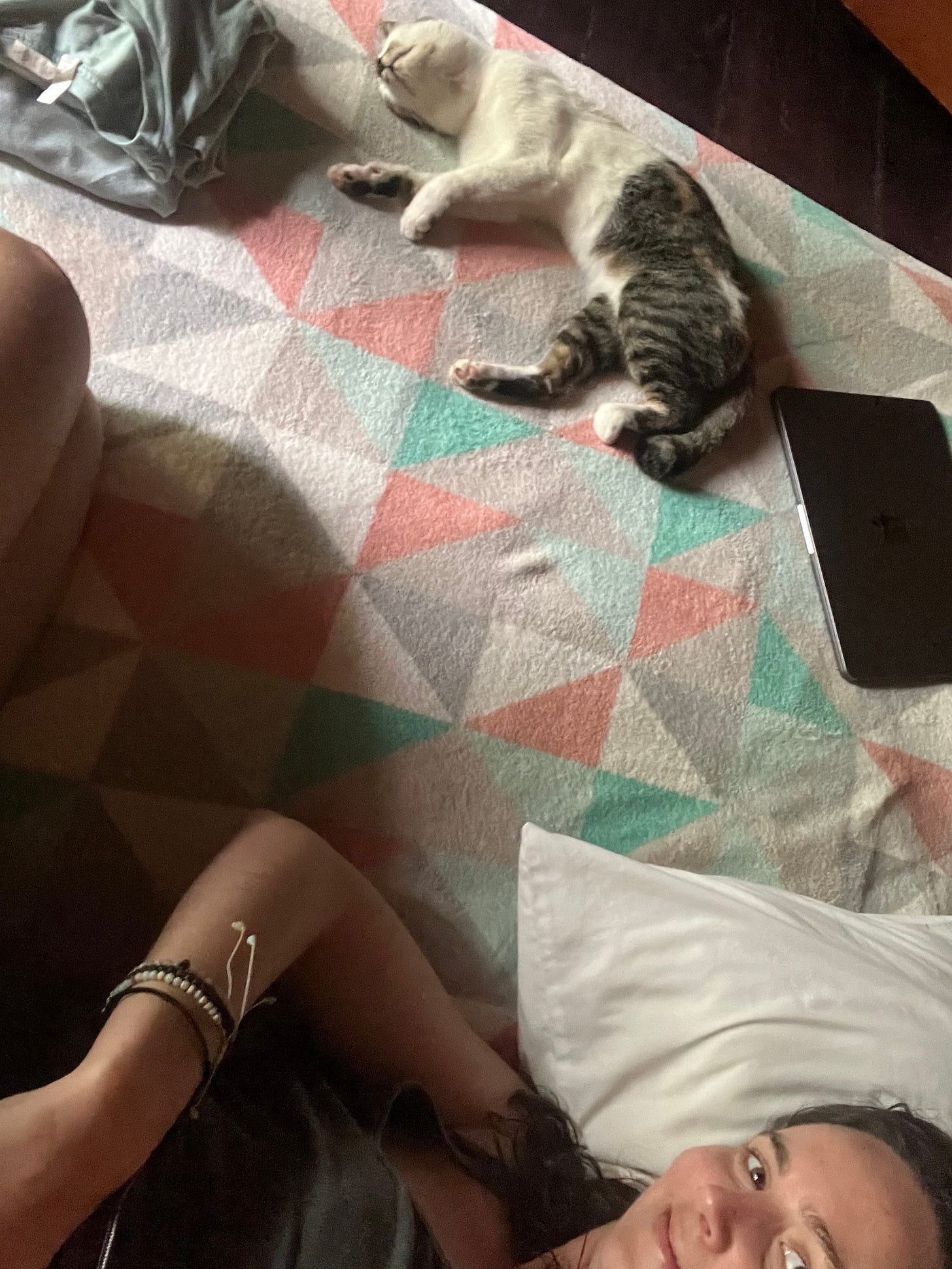
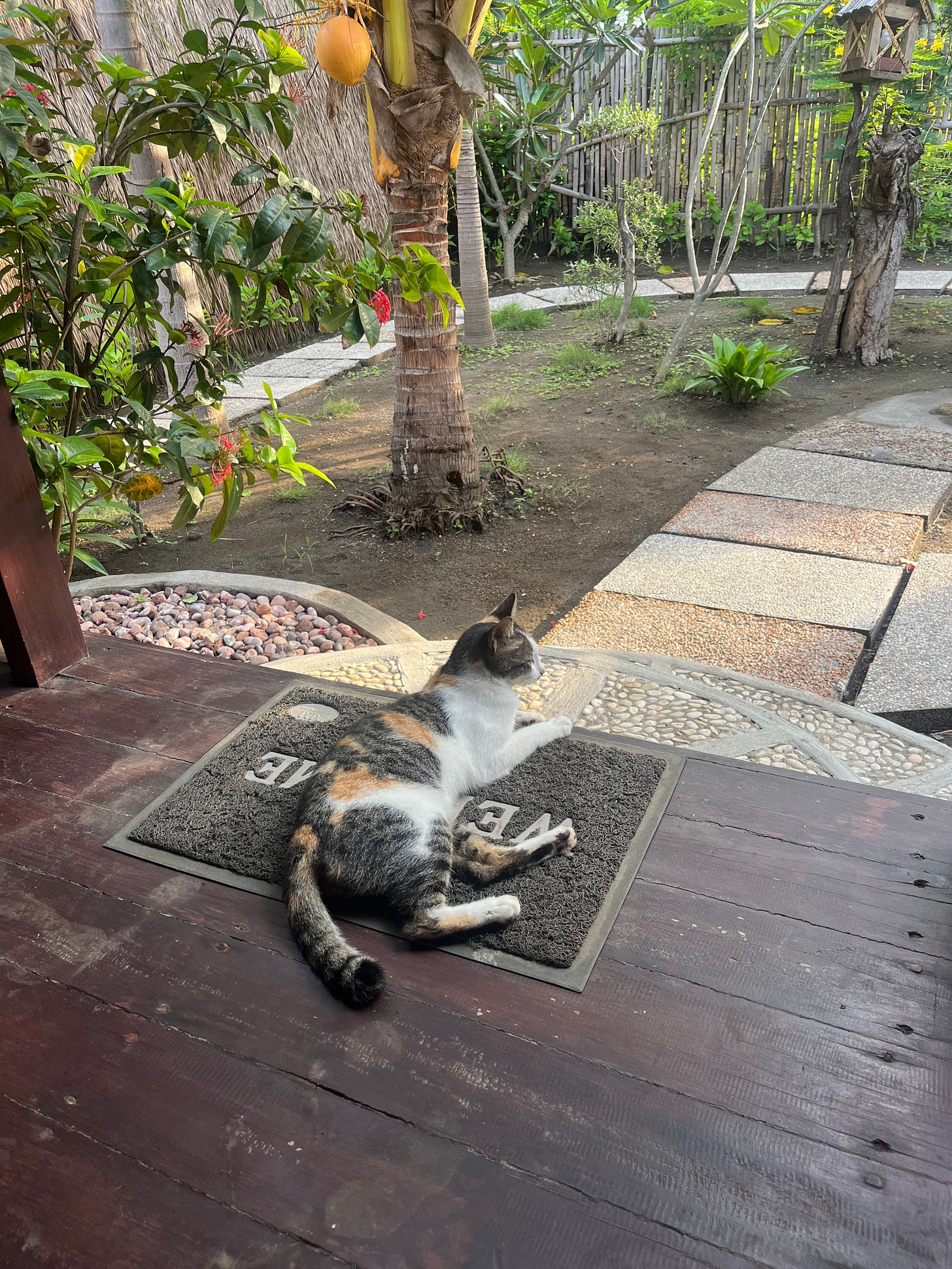
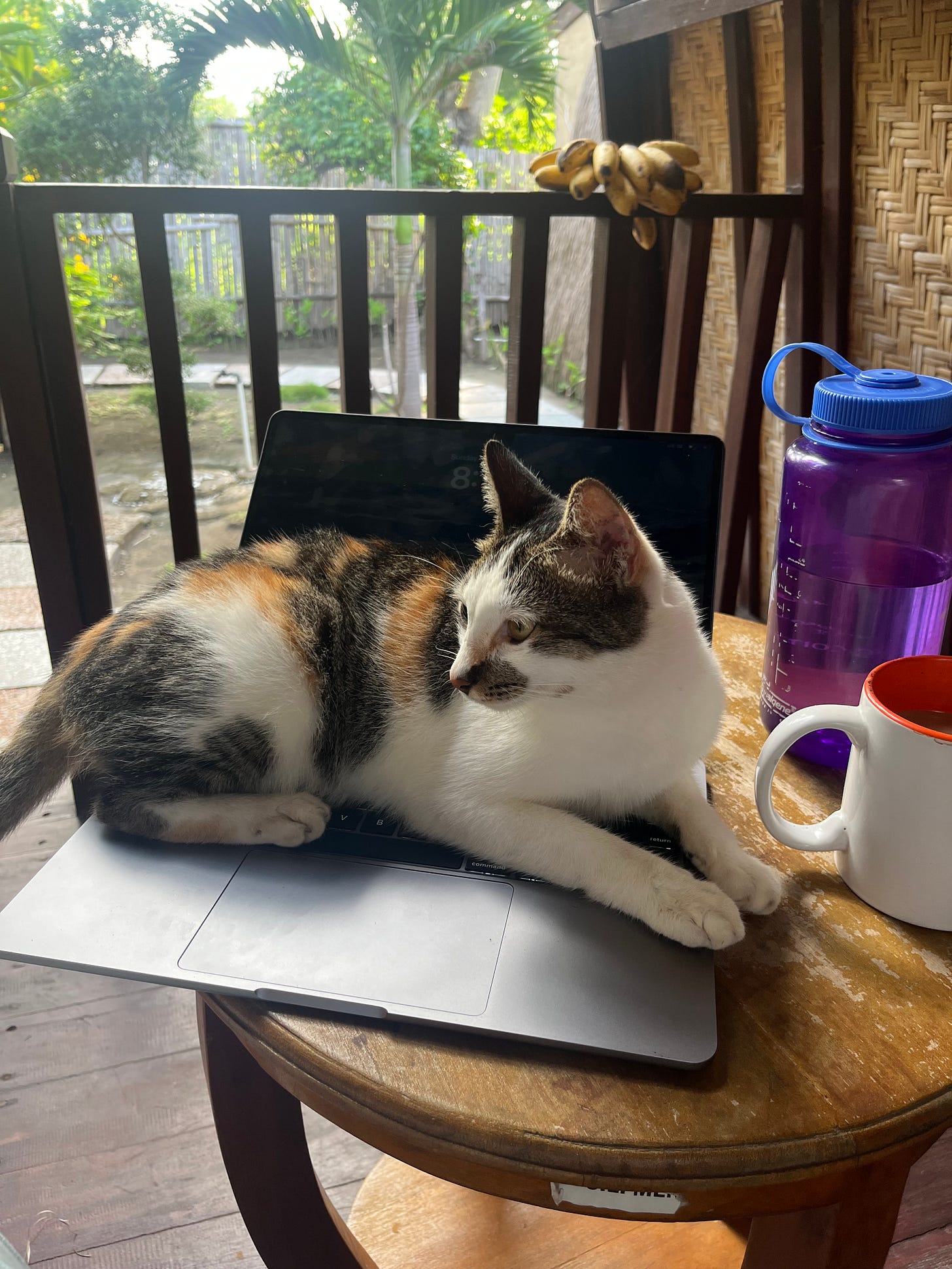
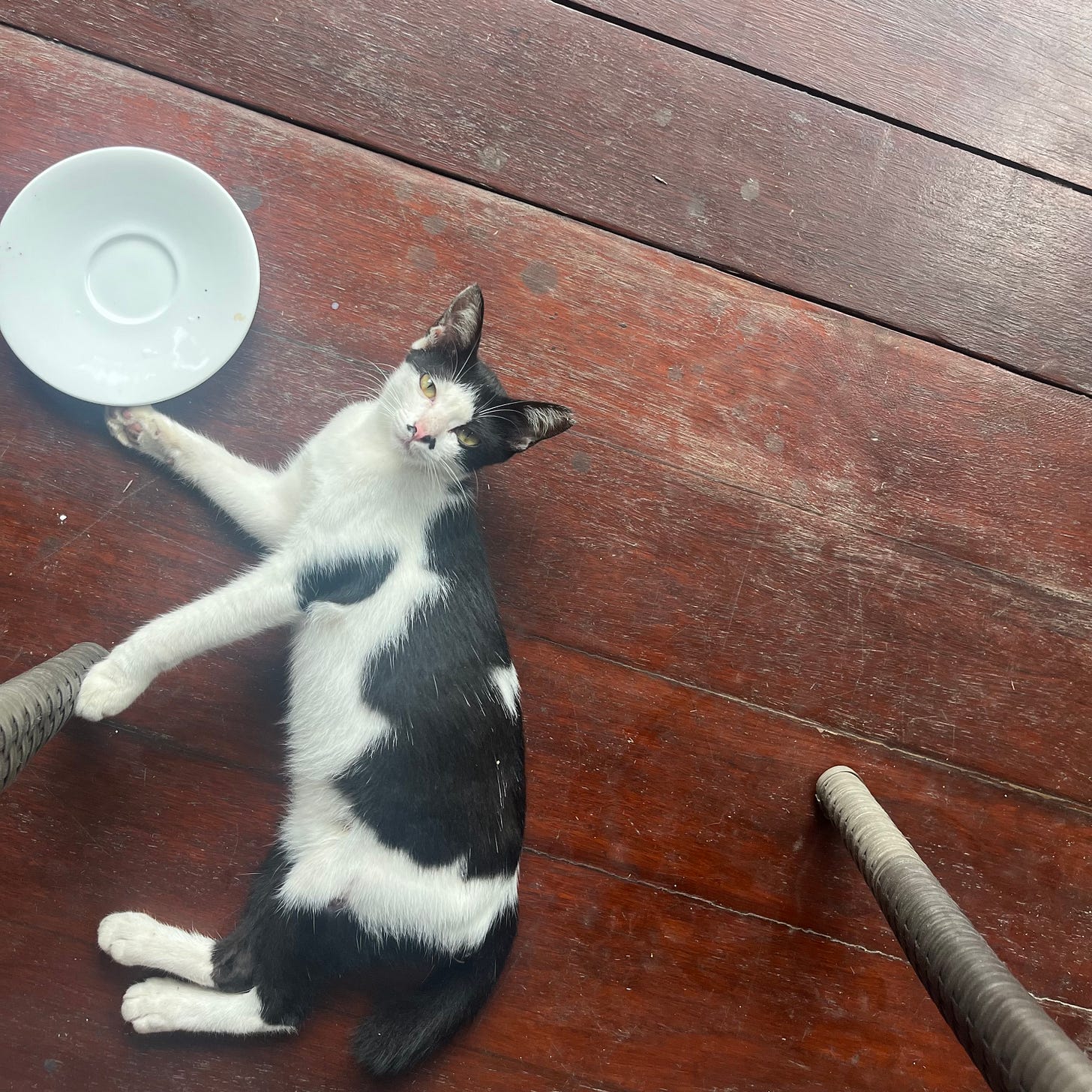
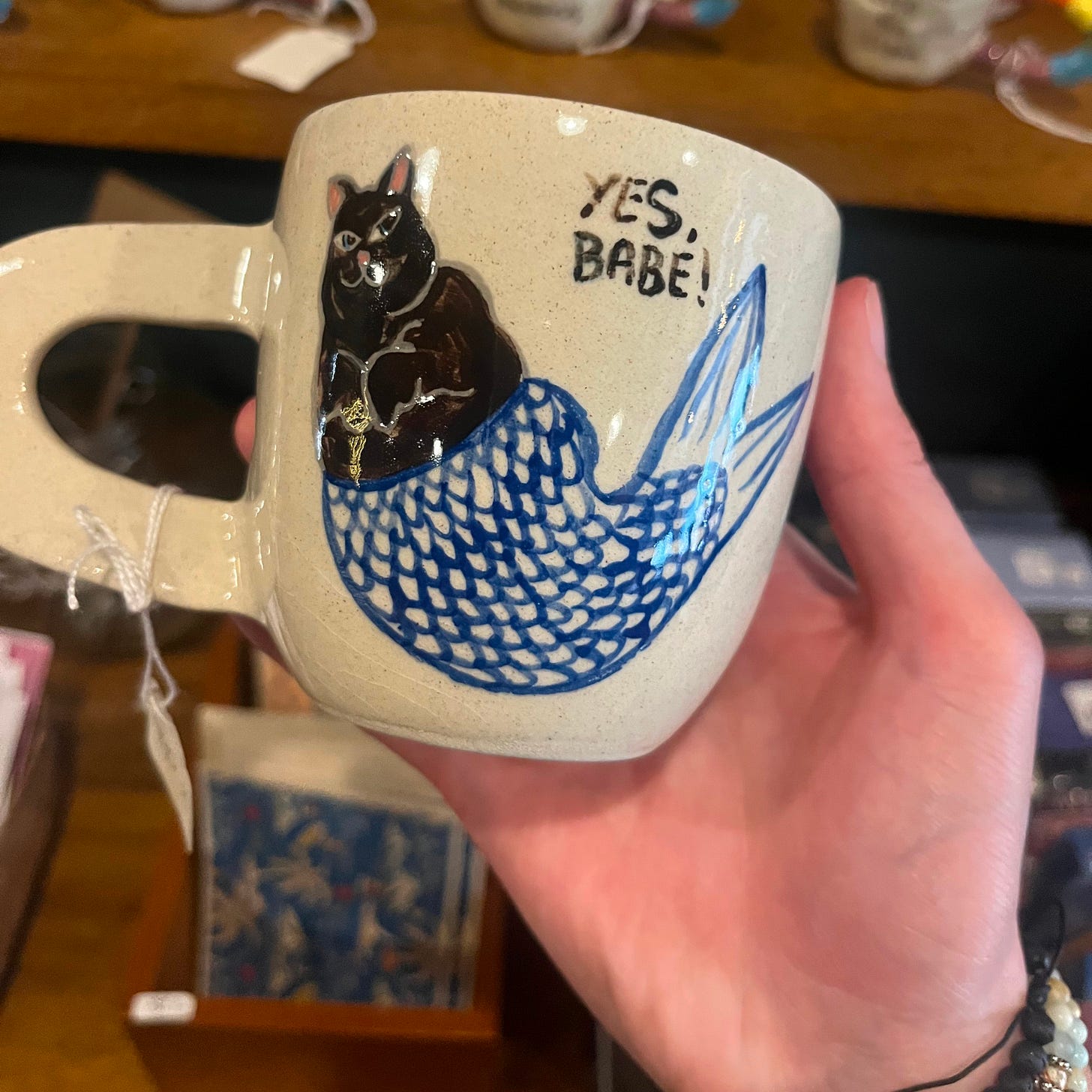
"Recognizing that, like all borders, walls are a temporary farce." - Love this. As I write a short essay on the importance of intentional companionship and friends who make us better, I love your thoughts on how our definition of that context can change. And especially to include nonhuman beings and even inanimate objects (*cue Tom Hanks scene from Cast Away*).
As a person who loves cats and the power of emotional support animals, I love this story, of course. We started following a stray cat that we saw in London, but then stopped because the thought of it starting to follow us and not being able to take her in or feed her made us sad!